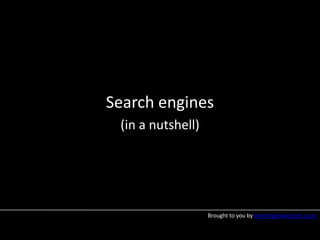Search Engines In A Nutshell
- 1. Search engines(in a nutshell)Brought to you by evolvingnewsroom.co.nz
- 2. The world wide web is made up of pages
- 4. wSearch engines use web crawlers (or spiders) to trawl the world wide web looking at pages and indexing information on them such as headlines, titles, text and metadataBy Olddanb on Flickr
- 5. Search engines storethe indexed information about web pages for later reference By Tim Dorron Flickr
- 6. When we type keywords into a search engineŌĆ”ŌĆ£Swimming pool safetyŌĆØt(Key words)
- 7. ŌĆ”the search engine looks through the indexed pages for our keywords
- 8. It singles out the pages that feature our keywords and has a closer look
- 9. It calculates how often and how prominently our keywords appear on each page How many times keywords appear
- 10. Where keywords appear
- 11. Page title
- 12. A few more thingsThen it determines the relevance of the pages (GoogleŌĆÖs PageRank) ŌĆ”Secret sauce
- 13. ŌĆ” by counting how many websites are linking to a page. This one has only a few links
- 14. This one has lots. Google figures this page has already shown itself to be popular so itŌĆÖs likely to have useful content and be more relevant to you
- 15. The list of web pages displayed in the search results have been RANKED in order of relevance and according to the keyword and other calculations
- 17. Which just goes to show how important keywords are
- 18. You can read more about search engines on these websitesWikipedia on search enginesAbout.com on search engines
- 19. The EndBrought to you by evolvingnewsroom.co.nz
Editor's Notes
- The web is made up of web pages.
- Squillions of them.
- Search engines store information about these web pages. They use web crawlers - sometimes called spiders - to spread out across the world wide web and index pages as they go. The pages are analysed according to information such as headlines, titles, text and metadata and the information is indexed for later reference.
- When we type keywords into a search engineŌĆ”
- The search engine looks through the pages it has indexed and finds those that feature our keywords
- Then it does a few more calculations
- Calculations to see how often and prominently our keywords appear
- Then, in GoogleŌĆÖs case they calculate the pagesŌĆÖ relevance.
- Relevance is measured by looking at how many other websites are linking to the selected pages. This one has only a few links.
- This one has a lot more. Google figures that this page has already shown itself to be popular so itŌĆÖs likely to have useful content and be more relevant to you.

















